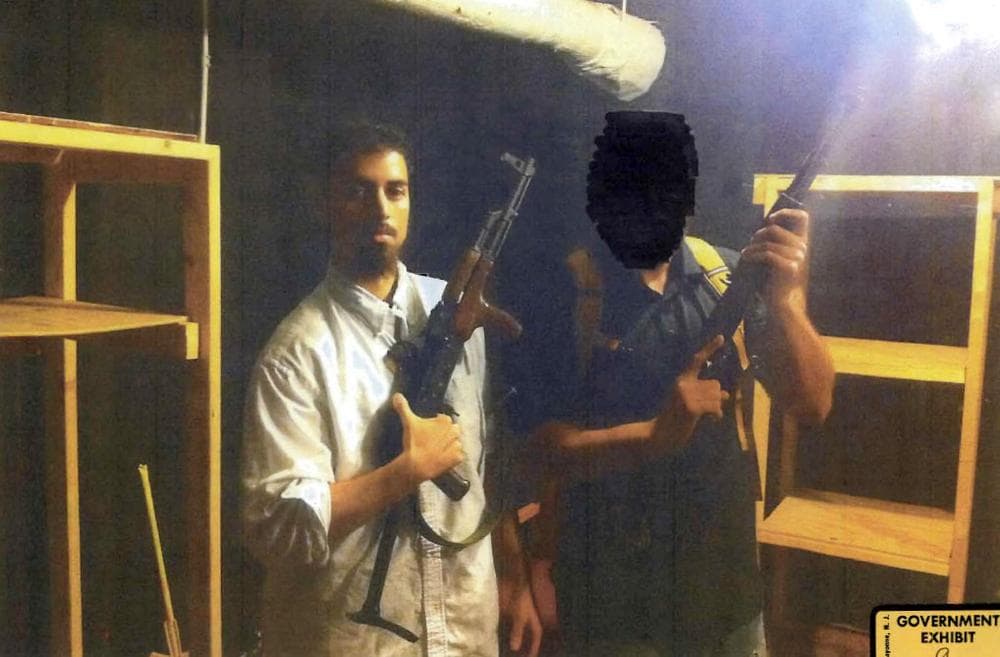Advertisement
At Hearing, Informant Under Fire In Ashland Terror Plot Case

Rezwan Ferdaus, the local college graduate and physics major facing detention as an accused terrorist, was described in starkly different terms in federal court Monday. The government calls him a "ticking time bomb" and his defense team describes him as a "mentally troubled" resident of a fantasy world.
Ferdaus is charged with attempting to attack the Pentagon and the U.S. Capitol by remote-controlled aircraft packed with explosives.
But the detention hearing put the FBI under the spotlight in what's become a two-ring circus.
In the first and main ring, Magistrate Judge Timothy Hillman didn't decide, and recent history says that whenever he does, the strong odds are he will rule for the government prosecutors who want to keep Ferdaus behind bars.
"This is not a one-page plan," prosecutor Stephanie Seigmann proclaimed in her closing argument. Holding up a thick detailed memo Ferdaus had allegedly given to the undercover agents he thought were al-Qaida operatives. She said the attack plan was "to terrorize the U.S. and kill as many 'kafir' (non-Muslims) as possible."
Ferdaus' 'Fantasy' Plan
"The only thing he wanted to do in life was this," she said, while the thin, goateed defendant sat in a semi-trance, head down, his eyes half-lidded, as he did throughout the proceeding.
"Whose idea was the remote-controlled aircraft?" she had asked the FBI supervisory agent who took the stand earlier.
"Mr. Ferdaus," the agent replied.
So too were the automatic weapons and the cellphones to be used as detonators.
Thirty times the undercover agents gave Ferdaus a chance to pull out, the federal prosecutor told the judge, but Ferdaus responded, "I just can't stop. There is no choice for me."
The prosecutor said Ferdaus' attack plan was "to terrorize the U.S. and kill as many 'kafir' (non-Muslims) as possible."
But this was all the fantasy of "a troubled mind," the defense responded. Public defender Miriam Conrad told the judge the government provided no evidence the defendant's plan would have actually worked.
"His plan is fantasy, because he's saying to the government informant, 'We're going to crash into the Pentagon, mow all the people down,' " Conrad said. "There are two of them — the informant and the defendant. It reads like something out of a video game."
Actually there would be four of them, the FBI supervisory agent had retorted earlier: the informant, Ferdaus and the undercover agents. In other words, Ferdaus had no one but imposters in his would-be terrorist cell.
"On his own, without the FBI, Mr. Ferdaus would not have done anything," said his defense.
Those were the arguments for and against detention, but then there was the second ring and sideshow involving the informant the FBI sent out to engage Ferdaus.
Advertisement
FBI Informant Under Fire For Past Convictions
The informant was known as Khalil, and the guy who signed him up was FBI agent John Woudenberg.
With the scalpel of a surgeon, Conrad established the informant's record: two convictions for selling drugs, unlawful restraint, a robbery conviction whose eight-year sentence he cut down to three by cooperating as a government witness elsewhere. And, of course, his history of what the agent referred to as Khalil's "difficulties" with heroin.
"When I signed him up, I believed him to be clean," Woudenberg said.
"You didn't ask him about his past history?"
"No," he replied.
The defense established the informant's record: two convictions for selling drugs, unlawful restraint, a robbery conviction whose eight-year sentence he cut down to three by cooperating as a government witness elsewhere.
Under further questioning, the agent acknowledged that Khalil had purchased heroin while on FBI video, though the agents missed it.
"Did you terminate him?"
"At that time we helped him get into a program," Woudenberg said.
The program lasted a week.
Did you terminate him, came the question again.
"We didn't use him for quite a few weeks."
Under FBI guidelines, Conrad pointed out, if you become aware an informant is committing crimes you have to report him. As it was, when Khalil was terminated in June 2010, he was not terminated for causes the agent acknowledged. That allowed the the FBI to bring Khalil back as an informant, once again, at the end of 2010 to go after Ferdaus.
Here's the earlier exchange between Conrad and Woudenberg:
"What steps did you take to ensure he wasn't using heroin?"
"He was much scrutinized. He was under the microscope."
"Did you give him a drug test?"
"No."
This was the first person the FBI sent out on the secret mission. From the agent who signed the informant up, the defense attorney extracted the following: On one wire, Khalil is heard to say that he's dope sick and needs a gram; he shoplifts while wearing the wire. He got got paid $10,000 by the FBI for his work with Ferdaus, $40,000 more for his informant work elsewhere.
And in April, when the FBI rented a room for Khalil and his girlfriend and she was blamed for trashing it, the FBI paid those damages, too.
But Woudenberg said he never gave his informant a drug test.
"We thought of it," he told the defense attorney, "but bureau policy didn't allow for it. So we didn't do it. There was no funding for that sort of thing."
So, Conrad said in closing, "You found it harder to get a drug testing kit than getting C4 explosives?"
"Objection," snapped the prosecutor.
"Sustained," snapped the judge magistrate, who told Conrad, "you're way out of line."
But Conrad's aim was straight, even if it was in the second ring of the detention hearing.
This program aired on November 15, 2011.
